
Harry Lillis "Bing" Crosby Jr. was an American singer, actor, television producer, television and radio personality and businessman. The first multimedia star, he was one of the most popular and influential musical artists of the 20th century worldwide. Crosby was a leader in record sales, network radio ratings, and motion picture grosses from 1926 to 1977. He was one of the first global cultural icons. Crosby made over 70 feature films and recorded more than 1,600 songs.

Louis Daniel Armstrong, nicknamed "Satchmo", "Satch", and "Pops", was an American trumpeter and vocalist. He was among the most influential figures in jazz. His career spanned five decades and several eras in the history of jazz. He received numerous accolades including the Grammy Award for Best Male Vocal Performance for Hello, Dolly! in 1965, as well as a posthumous win for the Grammy Lifetime Achievement Award in 1972, and induction into the National Rhythm & Blues Hall of Fame in 2017.

Charles Parker Jr., nicknamed "Bird" or "Yardbird", was an American jazz saxophonist, band leader, and composer. Parker was a highly influential soloist and leading figure in the development of bebop, a form of jazz characterized by fast tempos, virtuosic technique, and advanced harmonies. He was a virtuoso and introduced revolutionary rhythmic and harmonic ideas into jazz, including rapid passing chords, new variants of altered chords, and chord substitutions. Primarily a player of the alto saxophone, Parker's tone ranged from clean and penetrating to sweet and somber.
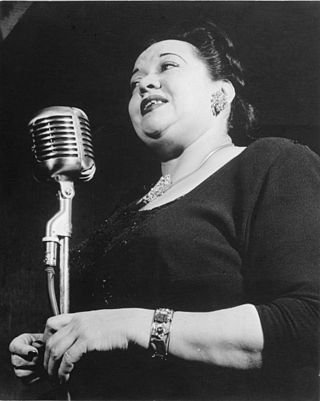
Mildred Bailey was a Native American jazz singer during the 1930s, known as "The Queen of Swing", "The Rockin' Chair Lady" and "Mrs. Swing". She recorded the songs "For Sentimental Reasons", "It's So Peaceful in the Country", "Doin' The Uptown Lowdown", "Trust in Me", "Where Are You?", "I Let a Song Go Out of My Heart", "Small Fry", "Please Be Kind", "Darn That Dream", "Rockin' Chair", "Blame It on My Last Affair", and "Says My Heart". She had three records that reached number one on the popular charts.

John Aaron Lewis was an American jazz pianist, composer and arranger, best known as the founder and musical director of the Modern Jazz Quartet.
Edwin LeMar "Buddy" Cole was a jazz pianist, organist, orchestra leader, and composer. He played behind a number of pop singers, including Rosemary Clooney and Bing Crosby.
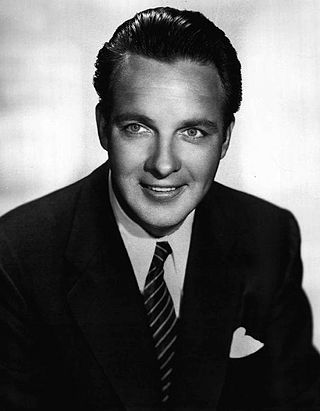
George Robert Crosby was an American jazz singer and bandleader, best known for his group the Bob-Cats, which formed around 1935. The Bob-Cats were a New Orleans Dixieland-style jazz octet. He was the younger brother of famed singer and actor Bing Crosby. On TV, Bob Crosby guest-starred in The Gisele MacKenzie Show. He was also a regular cast member of The Jack Benny Program, on both radio and television, taking over the role of bandleader after Phil Harris' departure. Crosby hosted his own afternoon TV variety show on CBS, The Bob Crosby Show (1953–1957). Crosby received two stars on the Hollywood Walk of Fame, for television and radio.

Gary Evan Crosby was an American actor and singer. His parents were Bing Crosby, of whom he wrote a highly critical memoir, and the singer and actress Dixie Lee.

Bing with a Beat was Bing Crosby's seventh long play album but his first with RCA Victor. It was recorded at the Radio Recorders "Annex" Studio in Los Angeles and released on vinyl in September 1957. Bing with a Beat is a 1957 concept album where the songs feature "hot" jazz and dixieland arrangements by Matty Matlock, played by Bob Scobey's Frisco Jazz Band.

Al Rinker was an American musician who began his career as a teen performing with Bing Crosby in the early 1920s in Spokane, Washington. In 1925 the pair moved to Los Angeles, eventually forming the Rhythm Boys trio with Harry Barris.
"Song of the Dawn" was a 1930 song, first introduced in the musical film King of Jazz. The song was originally written for Bing Crosby, who lost the part to John Boles, another actor in the film, due to Crosby being jailed for a motoring offence.
"Softly, as in a Morning Sunrise" is a song with music by Sigmund Romberg and lyrics by Oscar Hammerstein II from the 1928 operetta The New Moon. One of the best-known numbers from the show, it is a song of bitterness and yearning for a lost love, sung in the show by Philippe (tenor), the best friend of the hero, Robert Mission (baritone).
"Muskrat Ramble" is a jazz composition written by Kid Ory in 1926. It was first recorded on February 26, 1926, by Louis Armstrong and his Hot Five, and became the group's most frequently recorded piece. It was paired on the flip side with another one of Armstrong's hits, "Heebie Jeebies." It was a prominent part of the Dixieland revival repertoire in the 1930s and 1940s, and was recorded by Bob Crosby, Roy Eldridge, Lionel Hampton, Woody Herman, Muggsy Spanier, Chet Atkins, Lu Watters, the Andrews Sisters, Harry James, and Al Hirt, among others. It is considered a part of the jazz standard repertoire.
Charles Rinker was an American lyricist who worked frequently with Gene de Paul and Bob Rothberg, among others. His older brother, Al Rinker, was one of the famous Rhythm Boys with Bing Crosby in the late 1920s. His sister, Mildred Bailey, was a popular and influential American jazz singer during the 1930s.
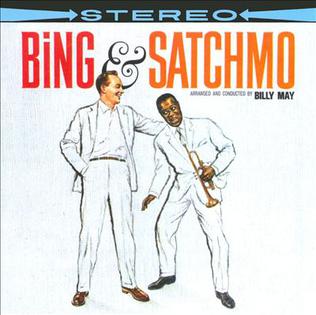
Bing & Satchmo is a 1960 studio album by Bing Crosby and Louis Armstrong that was arranged and conducted by Billy May. The album was recorded for Crosby's label, Project Records, and released by MGM.
"The Old Master Painter" is a song composed by Beasley Smith with lyrics by Haven Gillespie about a spiritual rendering of a sunset which evokes God. Published in 1949, it has since been recorded by many different artists, including Jackie Paris, Richard Hayes, Dick Haymes, Frank Sinatra, Snooky Lanson, Peggy Lee, Phil Harris and Mel Tormé.
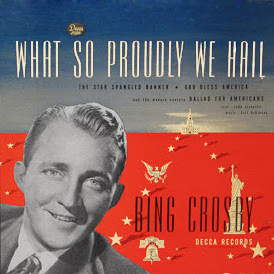
What So Proudly We Hail is a compilation album of phonograph records by Bing Crosby released in 1946 featuring songs that were sung by Crosby in an American-type patriotic style. This album featured Bing singing patriotic songs such as: "Ballad for Americans", "God Bless America" and "The Star-Spangled Banner". The songs were later presented in a 33 1/3 rpm split set with The Man Without a Country.
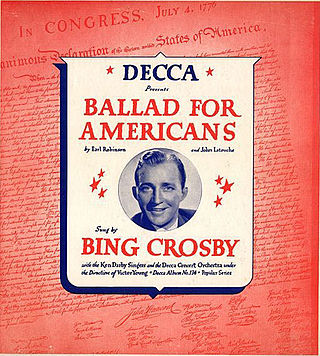
Ballad for Americans is a studio album of phonograph records by Bing Crosby released in 1940 featuring the popular "Ballad for Americans" sung by Crosby in an American-type patriotic style. In 1946, the two records in this album were put into a new album called What We So Proudly Hail. This was Crosby's first studio album that was not a reissue of earlier singles.

'Bing and the Dixieland Bands is a Decca Records album by Bing Crosby featuring songs with a Dixieland flavour which was issued as a 10” LP with catalog No. DL5323 and as a 4-disc 78rpm box set (A-852) and as a 4-disc 45rpm set (9–232).













